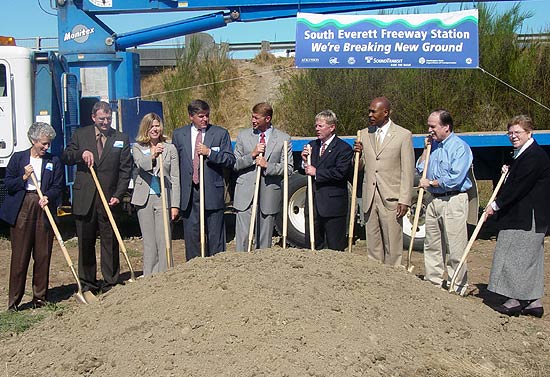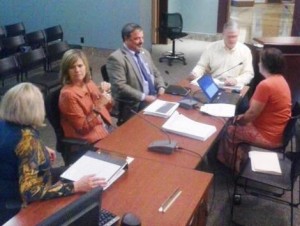Article by Brenda Stonecipher, Epiphany School
Feature image: Downtown Everett, Washington, heading into the historic district. The city is 25 miles north of Seattle. Photo credit: Emersb.
My first foray into political action came when I was very young. In comparing my weekly allowance with the rest of the kids in my neighborhood, I was surprised by the broad range of payments and the variability in the amount of work required to earn them. While my own parents supported an allowance-for-chores scheme that fell in the middle of the pack, there were, in my mind, injustices at the top and bottom ends of the spectrum that required remedy.

Everett, Washington as seen from Possession Sound
Growing up in Everett, Washington, a blue-collar city of just over 100,000 people that is home to the Boeing Company, and as the child of two labor union members, I used the tool that I had seen employed to some success — an organized strike. Construction-paper signs, emblazoned with “On Strike! For Fair Allowances for Underage Workers” were distributed to all willing participants, and some kids with more generous allowances were goaded into supporting the cause, for the good of the order. After many successive days picketing outside our homes, the “evil empire” (i.e., our parents) capitulated to our demands for a fee-for-service schedule with higher payments for more skilled jobs. It was an early victory that reinforced in me the exercise of political power.

Stonecipher is in her fourth term as a member of the Everett City Council
Then for a long stretch, my political life was fairly boring. I turned 18, registered to vote and became what political campaigns refer to as a 4/4 voter (i.e., one who has voted in four of the last four elections — thus, a reliable voter), and an “I” (independent, or not affiliated with either party). My political life did not become a front-burner issue for me again until many years later, when, like many stories of political engagement, my government failed me.
It was really a series of successive failures. I was a volunteer on the board of directors for a nonprofit performing arts group that had a contract with our city to manage and produce theatre at a local performing arts center. We felt the city was not holding up its end of the bargain. When our board approached elected city council members with our concerns, we were disappointed by their lack of accountability. In addition, my local school board was failing to address discriminatory practices in our schools, and at the national level I was disappointed by the scant evidence used to lead our country to war. I had attended enough public meetings to know that my comments were falling on deaf ears. The lack of leadership and humility in elected representatives spurred me to act.

Stonecipher (third from left) at the groundbreaking of South Everett Freeway Station and Park-and-Ride lot, March 2011. Photo courtesy of Sound Transit.
Fed up, in 2003 I decided to run for city council. I had absolutely no idea what I was getting into. I had never worked on a political campaign, had never donated to a campaign, and did not know the first thing about organizing a campaign committee. I chose to run against a 26-year incumbent who had not faced a significant challenger in the previous few election cycles, figuring he might be out of practice on campaigning. While my opponent raised more than twice as much money as I did, I had a new pair of sneakers, a good brochure and made time to knock on doors to talk to voters and ask for their support. In November, I won with 69 percent of the vote — a record against an incumbent in our city that still stands today.
Fourteen years later, I am in my fourth term on the city council. It is a part-time position, with a meeting every Wednesday. On the other nights of the week, I attend neighborhood association meetings, meet with citizens, research issues facing my community, serve as a liaison to city boards and commissions, and attend other community events. In all, I spend an average of about 20 hours a week on council business.

Stonecipher at work with the Everett City Council
On top of my very demanding position at my school, many people wonder where I get the time and energy for this work. I am fortunate to be one of those people who can operate on six hours of sleep a night, and I truly do thrive on public service. The work is gratifying and is in many respects similar to being a CFO in an independent school. At times, I am simply helping citizens connect with government to solve an immediate problem they are facing, such as a derelict home in their neighborhood. I also do a lot of research on policy issues, such as incentives for affordable housing or parks expansion funding. And, of course, there are times when citizens are angry and taking it out on me, when I have to listen, be patient, and remember to not take things personally. These are all important skills for politicians, but also good traits that anyone in a leadership position should possess.
I am proud of the work I have done in helping keep our city’s budget on track, even through the recession, and in leading the effort to do more long-term financial planning and capital budgeting —difficult for government, given the election cycle and political pressures during election years. I have helped expand parks in our community and stopped a plan to annex a large area outside the city, which would have cost more than the tax revenues it would have generated.
As I serve out the last two years of my last term, I have transitioned to imparting what I’ve learned onto the newer members of the city council, as well as encouraging others to run for office. My passion for political action at all levels is as strong as it has ever been, and I look forward to continuing to use my knowledge and interest to inspire positive change at all levels of government.


.png?sfvrsn=e0147111_1)


